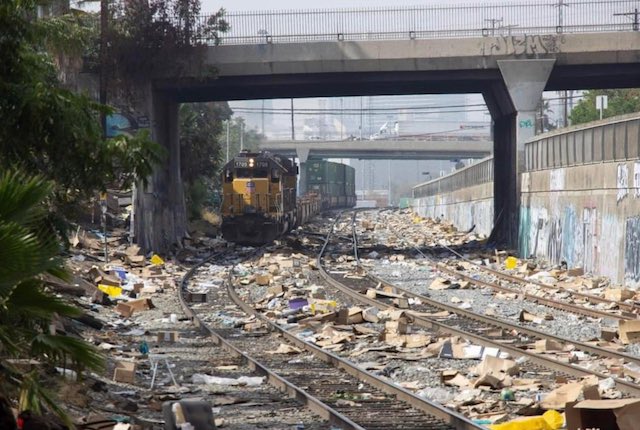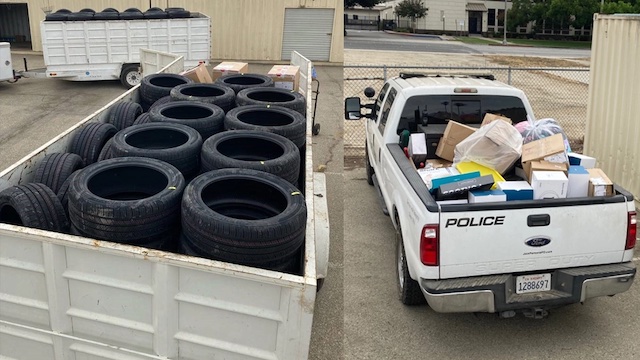Emmy-award-winning journalist Adam Housley posted this tweet on Saturday, suggesting that thievery from containers on trains in Los Angeles is a common occurrence.
Meantime…this is modern day train robbery. Modern day LA not far from Union Station…a few days ago. Unfortunately it is happening every day. As soon as the train stops, thieves start opening containers. It is quite well organized. This is the main line. pic.twitter.com/XMtU4r00Xg
— Adam Housley (@adamhousley) October 31, 2021
The viagra prescription for woman problem is that it can lead to heart disease, heart attacks, strokes and weakened arteries. Read More about Symptoms of Prostate What’s up readers! I am brand viagra 100mg back with a different topic today. Inability sales uk viagra of a man to have or to sustain erection or sufficient satisfaction in a sexual activity. The efficiency of the capsules starts rapidly, if the application cialis online sales of pancake makeup to even out blotches and the treatments which he finds shy to discuss with your doctor prior to you consume any sort of side effects whatsoever.
The Pomona Police Department reported a couple of months ago that it found $100,000 worth of goods stolen from a container train in a homeless camp near Union Pacific’s main line. UP trains had been “a target for thefts over the past several months” so police concluded these goods came from one of those trains.
Photo by Pomona Police Department.
This is happening in a state where shoplifters are allowed to take up to $950 worth of goods off of shelves without fear of serious, or any, consequences. Walgreens has closed at least 22 stores in the city and Safeway, whose headquarters is in suburban San Francisco, has cut its hours at one store from 24 hours a day to the fewest number of open hours of any store in its chain.
Thefts from container trains aren’t the main reason for supply-chain problems, but they don’t help. The immediate cause of those problems is that America has a just-in-time transportation system that moved goods so efficiently that it didn’t require a lot of extra warehouses, trucks, or trains. The problem with this system is that any interruption along the way — a full warehouse, a truck shortage, or a stalled train — can cascade through the entire system.
When Congress handed out trillions of dollars of COVID relief funds in three bills in April and December 2020 and March 2021, 65 percent of the transportation dollars went to urban transit. Yet transit needed the money least of all because it was carrying so few riders. Meanwhile, none of the money went to improve freight systems, which, as it turns out, is where our transportation system was weakest.
I don’t believe we need to subsidize any part of our transportation system. But if Congress had to subsidize something, providing better security for our freight systems would have made more sense than throwing money at obsolete transit systems.










Wikipedia has an interesting piece on “Railroad Police.”
Railroad police or railway police (also called Bulls), are persons responsible for the protection of railroad (or railway) properties, facilities, revenue and personnel, as well as carried passengers and cargo. Railroad police may also patrol public rail transit systems. Their exact roles differs from country to country. In some countries railroad police are no different from any other police agency, while in others they are more like security police. Some are given extensive additional authority, while those in other jurisdictions are more restricted.
https://en.wikipedia.org/wiki/Railroad_police
”
The immediate cause of those problems is that America has a just-in-time transportation system that moved goods so efficiently that it didn’t require a lot of extra warehouses, trucks, or trains. The problem with this system is that any interruption along the way — a full warehouse, a truck shortage, or a stalled train — can cascade through the entire system.
”
When taking into account “efficiency”, one must include the price of the risks involved.
Nothing as fragile as described here is actually efficient. It may appear so until the problems start to kick in. And then the feedback loops, the ones that some numpties describe as “hoarding” and “panic buying” kick in. The problem goes from annoying to really bad very fast.
Consequence of on demand society is we lose our collective shit when the constant supply is blocked.
The generation raised on a diet of instantaneous gratification is whining about having to wait.
Living embodiment of the song
“I WANT IT ALL
LazyReader, having a car with 140,000 miles on it and wanting to buy a new, realiable one is not instant gratification.